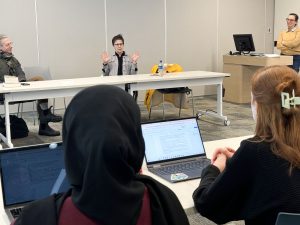In the words of the great dramatist William Shakespeare: “To be or not to be; that is the question.”
Can drama provide the answer for those learning English as a foreign language?
A Brock research team has found that using drama and theatre techniques in the classroom significantly improved students’ fluency and comprehensibility in English.
The study, co-authored by former graduate student Angelica Galante and Associate Professor of Linguistics Ron Thomson, focused on a group of 24 Brazilian adolescents learning English in São Paulo, Brazil.
The researchers collected speech samples of the adolescents before and after their participation in a four-month, drama-based English language program.
In addition to comparing the adolescents’ before-and-after results, the researchers compared the adolescents’ oral skills development with that of a control group – learners who received four months of traditional communicative English language lessons in the classroom.
Thirty untrained Canadian native English speakers evaluated random speech samples from the two groups and rated the samples on their fluency, comprehensibility and degree of accent.
The samples that proved to be the most fluent and easily understood came from the group that used the drama and theatre techniques.
“This result is important because it indicates that explicit instruction can improve fluency compared to other communicative approaches “ says Galante.
“Some have argued that there’s a connection between success in second language learning and your ability to see yourself as someone else,” Thomson explains.
“The person you’re imagining doesn’t have to be another person: it could be you. The idea is that the extent to which you can set aside your existing first language identity and assume a second language identity might promote optimal learning.”
Fluency refers to the fluidity of speech, or how easily someone is able to speak a foreign language. Comprehensibility is how much effort listeners exert in processing accented speech, while accentedness refers to how a speaker’s accent and speech compares to a target variety of that language.
Galante looked to drama and theatre education to provide some fresh approaches to helping non-native English-speaking people master these concepts.
“After going to theatre school, I started noticing the many strategies that we use on the stage could easily be applied in the classroom; for example, improvisation, intonation, voice projection, clear speech, expressing emotions, rhythm and appropriate pausing,” says Galante, who is the study’s first author.
“While both groups had traditional pronunciation lab classes, the learners in the drama group had opportunities to practice vocal projection, volume, improvised speech, and expression of emotions,” she says.
Galante says the research also shows that someone’s accent is “not really a problem” when it comes to understanding someone’s speech or how fluent the person is.
Thomson indicates that “the impact of a foreign accent on communication often has more to do with how much experience a listener has with a particular accent, and his or her willingness to listen to a foreign-accented speaker.”
Someone could have a very strong accent and still be comprehensible.
“A widely cited example is the ‘Henry Kissinger’ effect: he had a very strong accent but nobody had difficulty understanding him, whereas comprehensibility is important for communication, more so than accent,” says Thomson.
The study, published February 2016 in the online journal TESOL Quarterly, arose from Galante’s Master’s thesis, which explored ways to improve students’ “oral fluency, comprehensibility and accentedness.” A video abstract of the study can be found on YouTube here.










